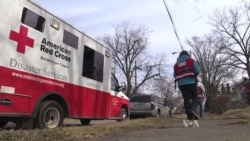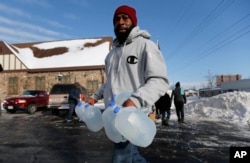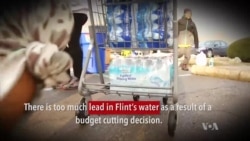"It’s a basic human need. You can’t survive without water," says Virginia Bielasco, one of an army of volunteers who have descended here to perform one basic mission: get safe, clean water to those who need it, which is just about everybody who lives here.
As word of the water crisis spread, thousands of volunteers from around the country descended to offer help to residents of this struggling city in the Midwestern state's southeast. The American Red Cross is one of many organizations working to provide safe drinking water in a crisis with no immediate end in sight.
Bielasco’s home is in Byron, Illinois, about a seven-hour drive from the middle-class residential neighborhood where she is delivering cases of bottled water. The lack of safe drinking water is a problem that hits close to home, no matter where you live.
"The most eye-opening experience for me is just to think that we’re in the United States," she said, "and here we have a city where the people cannot just turn on their tap and have reliable water."
Keith Alvey is the American Red Cross division disaster executive managing the agency’s relief efforts in Flint, where the crisis isn’t the usual sort of thing the aid organization responds to.
:It’s just the water supply," he said. "It’s not as if we’re faced with a tornado where you can see where the damage is or a hurricane where the winds have taken out multiple parts of the infrastructure. It’s all concentrated in the water."
But being a different sort of crisis does not make this less critical. Alvey said the Red Cross has mobilized more than 2,000 volunteers to respond.
Biggest need: people, not water
Water here now comes in bottles instead of flowing from taps or shower heads. And the Red Cross, which is working with several different agencies in Flint to provide relief, says the biggest need isn’t more bottled water.
"There’s a need for people to go to all these different centers to help distribute water," said Linda Cieciek, a volunteer services specialist with the Red Cross.
"They are absolutely essential," echoed Alvey. "It’s one thing to have a warehouse full of water. It’s another to actually get it into the hands of people who actually need it."
Terence Johnson is one of those people. He has been dealing with the water crisis since December, and while he is grateful for the volunteers, he is growing weary of the wait for long-term fixes.
"Passing out water isn’t going to solve this problem. Fixing the pipelines will solve the problem," he said.
Watch: How Flint's Water Became Toxic








